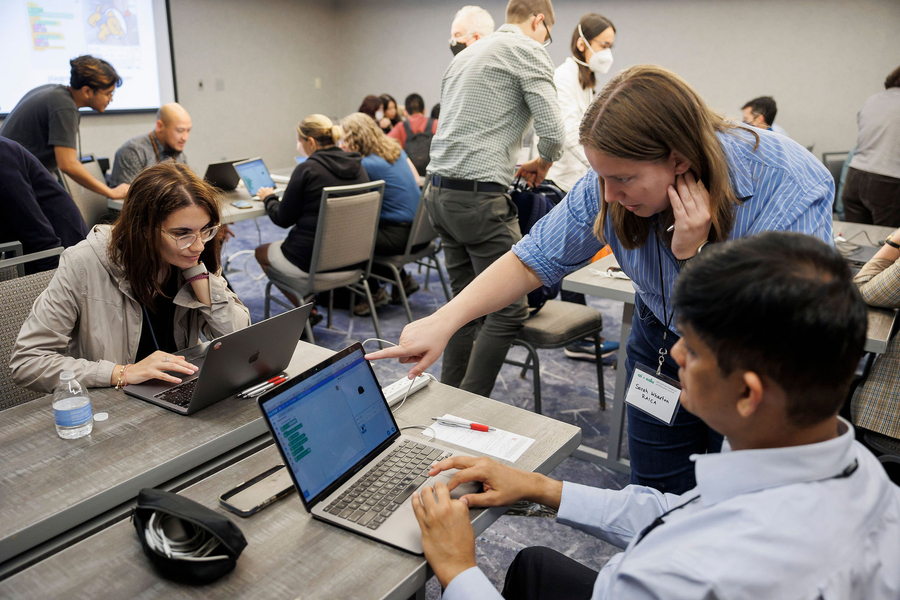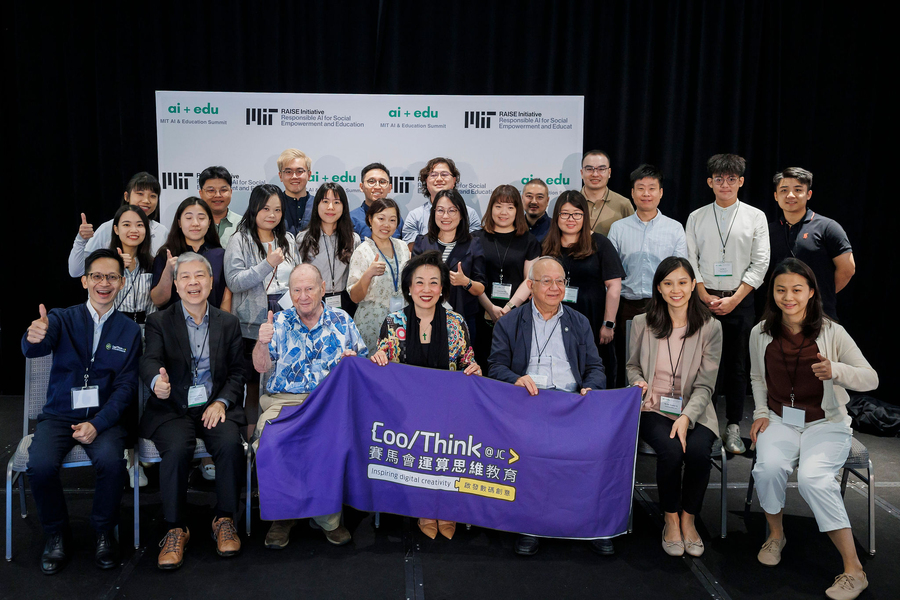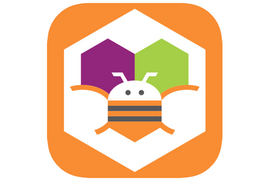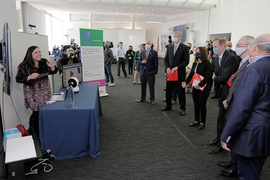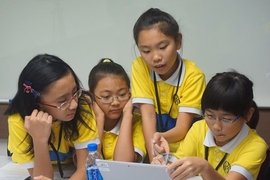This summer, 350 participants came to MIT to dive into a question that is, so far, outpacing answers: How can education still create opportunities for all when digital literacy is no longer enough — a world in which students now need to have AI fluency?
The AI + Education Summit was hosted by the MIT RAISE Initiative (Responsible AI for Social Empowerment and Education) in Cambridge, Massachusetts, with speakers from the App Inventor Foundation, the Mayor’s Office of the City of Boston, the Hong Kong Jockey Club Charities Trust, and more. Highlights included an onsite “Hack the Climate” hackathon, where teams of beginner and experienced MIT App Inventor users had a single day to develop an app for fighting climate change.
In opening remarks, RAISE principal investigators Eric Klopfer, Hal Abelson, and Cynthia Breazeal emphasized what new goals for AI fluency look like. “Education is not just about learning facts,” Klopfer said. “Education is a whole developmental process. And we need to think about how we support teachers in being more effective. Teachers must be part of the AI conversation.” Abelson highlighted the empowerment aspect of computational action, namely its immediate impact, that “what’s different than in the decades of people teaching about computers [is] what kids can do right now.” And Breazeal, director of the RAISE Initiative, touched upon AI-supported learning, including the imperative to use technology like classroom robot companions as something supplementary to what students and teachers can do together, not as a replacement for one another. Or as Breazeal underlined in her talk: “We really want people to understand, in an appropriate way, how AI works and how to design it responsibly. We want to make sure that people have an informed voice of how AI should be integrated into society. And we want to empower all kinds of people around the world to be able to use AI, harness AI, to solve the important problems of their communities.”
Video: MIT Open Learning
The summit featured the invited winners of the Global AI Hackathon. Prizes were awarded for apps in two tracks: climate and sustainability, and health and wellness. Winning projects addressed issues like sign-language-to-audio translation, moving object detection for the vision impaired, empathy practice using interactions with AI characters, and personal health checks using tongue images. Attendees also participated in hands-on demos for MIT App Inventor, a “playground” for the Personal Robots Group’s social robots, and an educator professional development session on responsible AI.
By convening people of so many ages, professional backgrounds, and geographies, organizers were able to foreground a unique mix of ideas for participants to take back home. Conference papers included real-world case studies of implementing AI in school settings, such as extracurricular clubs, considerations for student data security, and large-scale experiments in the United Arab Emirates and India. And plenary speakers tackled funding AI in education, state government’s role in supporting its adoption, and — in the summit’s keynote speech by Microsoft’s principal director of AI and machine learning engineering Francesca Lazzeri — the opportunities and challenges of the use of generative AI in education. Lazzeri discussed the development of tool kits that enact safeguards around principles like fairness, security, and transparency. “I truly believe that learning generative AI is not just about computer science students,” Lazzeri said. “It’s about all of us.”
Trailblazing AI education from MIT
Critical to early AI education has been the Hong Kong Jockey Club Charities Trust, a longtime collaborator that helped MIT deploy computational action and project-based learning years before AI was even a widespread pedagogical challenge. A summit panel discussed the history of its CoolThink project, which brought such learning to grades 4-6 in 32 Hong Kong schools in an initial pilot and then met the ambitious goal of bringing it to over 200 Hong Kong schools. On the panel, CoolThink director Daniel Lai said that the trust, MIT, Education University of Hong Kong, and the City University of Hong Kong did not want to add a burden to teachers and students of another curriculum outside of school. Instead, they wanted “to mainstream it into our educational system so that every child would have equal opportunity to access these skills and knowledge.”
MIT worked as a collaborator from CoolThink’s start in 2016. Professor and App Inventor founder Hal Abelson helped Lai get the project off the ground. Several summit attendees and former MIT research staff members were leaders in the project development. Educational technologist Josh Sheldon directed the MIT team’s work on the CoolThink curriculum and teacher professional development. Karen Lang, then App Inventor’s education and business development manager, was the main curriculum developer for the initial phase of CoolThink, writing the lessons and accompanying tutorials and worksheets for the three levels in the curriculum, with editing assistance from the Hong Kong education team. And Mike Tissenbaum, now a professor at the University of Illinois at Urbana-Champaign, led the development of the project’s research design and theoretical grounding. Among other key tasks, they ran the initial teacher training for the first two cohorts of Hong Kong teachers, consisting of sessions totaling 40 hours with about 40 teachers each.
The ethical demands of today’s AI “funhouse mirror”
Daniel Huttenlocher, dean of the MIT Schwarzman College of Computing, delivered the closing keynote. He described the current state of AI as a “funhouse mirror” that “distorts the world around us” and framed it as yet another technology that has presented humans with ethical demands to find its positive, empowering uses that complement our intelligence but also to mitigate its risks.
“One of the areas I’m most excited about personally,” Huttenlocher said, “is people learning from AI,” with AI discovering solutions that people had not yet come upon on their own. As so much of the summit demonstrated, AI and education is something that must happen in collaboration. “[AI] is not human intellect. This is not human judgment. This is something different.”
